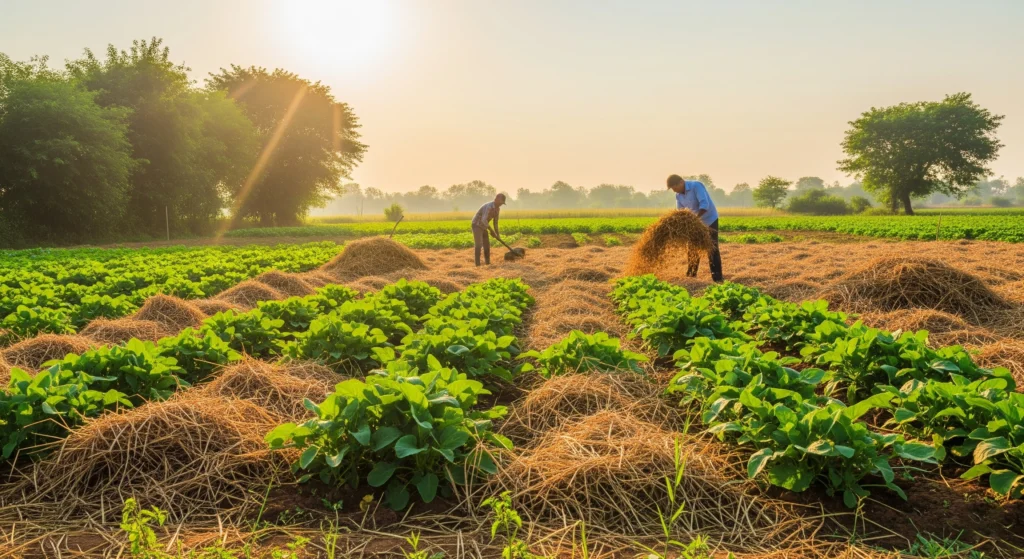Are you an Indian farmer struggling with low crop yields, water retention issues, or unpredictable weather patterns? If yes, you are not alone. Seasonal challenges can greatly impact soil health and productivity. But there’s a simple solution that can turn things around—mulching strategies.
Mulching not only improves soil moisture but also controls weed growth and increases overall yield. This blog will walk you through five effective seasonal mulching strategies tailored for Indian conditions, helping you make the most out of each planting cycle.
Whether you’re looking for mulching film in Indore, or exploring trusted agricultural mulch film suppliers in Indore, this guide will help you understand how to use mulch efficiently throughout the year.
1. Pre-Monsoon Mulching for Water Retention
Key Idea: Prepare the soil to retain water before heavy rains
Before the monsoon hits, apply mulching film to lock in existing moisture and prevent erosion. This strategy helps the soil stay firm, reduces runoff, and allows water to seep gradually.
Tips:
- Use black polyethylene mulch to prevent evaporation.
- Apply the film before the first monsoon shower for best results.
- Suitable for crops like maize, soybean, and pulses.
Real-World Application:
Farmers in Madhya Pradesh using mulch film before monsoon season have reported over 30% better moisture levels in the soil.
2. Post-Monsoon Mulching to Control Weeds
Key Idea: Suppress weed growth after the rainy season
Once the monsoon ends, weed growth becomes a serious issue. Applying mulching paper at this stage blocks sunlight from reaching weed seeds.
Tips:
- Use silver-black mulch film to reflect sunlight and discourage weed germination.
- Ideal for vegetable crops like brinjal, tomato, and chili.
3. Winter Mulching to Maintain Soil Warmth
Key Idea: Protect roots and promote steady growth
Cold weather can slow down root activity and crop growth. Mulching during winter maintains a stable temperature around the root zone.
Tips:
- Use transparent or clear mulch film for better heat absorption.
- Apply mulch in late November to early December.
- Perfect for crops like onion, garlic, and cabbage.
4. Summer Mulching to Reduce Soil Crusting
Key Idea: Prevent soil hardening and overheating
During Indian summers, extreme heat can form a crust on the soil, hampering plant growth. Mulch acts as a protective barrier.
Tips:
- Use white-on-black mulch film to reflect excessive heat.
- Apply mulch before sowing summer crops like watermelon and muskmelon.
5. Seasonal Crop Rotation with Mulch Application
Key Idea: Use mulch for different crops across seasons
Combining crop rotation with seasonal mulch film application enhances soil fertility and reduces pest buildup.
Tips:
- Choose the mulch type according to the upcoming crop and season.
- Always remove and replace film between crop cycles.
- Consult a mulching film manufacturer in Indore for the right thickness and color based on your crop.
Looking to improve your yield with high-quality mulch film? Contact the leading mulching film manufacturer in Indore for durable, UV-resistant options suited to Indian farming needs. Let’s boost your farm productivity—one layer at a time!
FAQs: Mulching Strategies for Indian Farmers
Q1: What is the best type of mulch film for Indian summers?
A: White-on-black mulch film is best for summers as it reflects heat and keeps the soil cool.
Q2: Can I reuse mulch film across seasons?
A: It’s best to use new film for each crop cycle to maintain effectiveness and hygiene.
Q3: How does mulching control weeds?
A: Mulch blocks sunlight, which prevents weed seeds from germinating.
Q4: Where can I find reliable mulch film in Indore?
A: You can connect with local mulching film manufacturers and agricultural mulch film suppliers in Indore for quality options.
Q5: Is mulching suitable for all crops?
A: While most vegetables and field crops benefit from mulching, consult with an expert for crop-specific advice.
Conclusion
Seasonal mulching is a smart, natural way to double your crop yield. By choosing the right strategy—pre-monsoon, post-monsoon, winter, summer, or rotational—you can enhance soil health, prevent weeds, and support sustainable farming.
Whether you’re looking for mulching paper in Indore or expert tips, now is the time to upgrade your farm’s productivity with mulch film.






